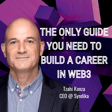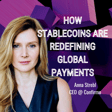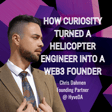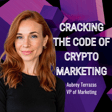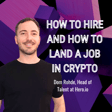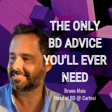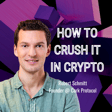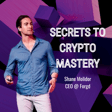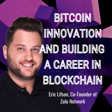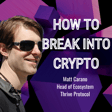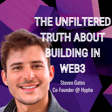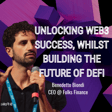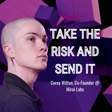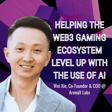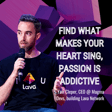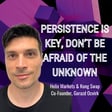Become a Creator today!Start creating today - Share your story with the world!
Start for free
00:00:00
00:00:01

Chat and Build's, Christel Buchanan's Secrets to Blockchain Success
Dive into a hugely insightful conversation with Christel Buchanan, the visionary founder of Chat and Build, as she shares her incredible journey from becoming one of Twitter’s first international hires to a trailblazer in AI and blockchain!
In this episode, Christel reveals the secrets behind building a no-code, AI-led development platform, Chat and Build, the gritty realities of startup life, and game-changing advice for aspiring founders and Web3 fam. From navigating the chaotic early days at Twitter to mastering the art of hiring exceptional teams, this episode is packed with insights that will inspire you to embrace risk, trust your intuition, and carve your path in the fast-evolving world of AI and Blockchain.
Transcript
Introduction to Crystal Buchanan
00:00:02
Speaker
Crystal, welcome to the show. How are you? thank Thanks for having me here. i really appreciate it. It's fantastic to be here today. Yeah, thanks for joining me. Crystal, for people who don't know who you are, could you introduce yourself, please?
00:00:15
Speaker
Yeah, sure. So hi, hi everybody. My name is Crystal crystal
Democratizing Software Development
00:00:19
Speaker
Buchanan. I'm the founder and CEO of Chat and Build and Pivotal. So we're creating what I like to call a no code social network.
00:00:27
Speaker
So what we're trying to do is essentially democratize software development by turning it from a technical skill into a creative and social experience that anyone can participate
Academic and Early Career Journey
00:00:37
Speaker
in. So my journey actually started at Oxford, where I did my dual post-grad masters in AI and major program management.
00:00:46
Speaker
I was also the first sort of one of the first employees for Twitter outside of the US, the 10th international hire, and I worked at Randwatch, a consumer intelligence company, as the VP of Asia, brought it to Asia Pacific back in
Experience at Twitter and Personal Interests
00:01:00
Speaker
2015. I can't believe it's about 10 years ago now.
00:01:03
Speaker
And was also an early team member at Zilliqa, one of my favorite ah blockchain projects that revolutionized the concept of sharding. And I guess, in a sense, what has been really consistent um throughout my career is you know being able to build communities around technology,
00:01:20
Speaker
So I've always been fascinated by how technology can remove barriers and create new possibilities for people. That's what has brought me to this point. And I guess chat and build has really been a combination of that journey using AI to make software creation accessible to anyone, not just developers.
00:01:38
Speaker
But on the personal side, I guess, I love, um you know, running, cycling, swimming. um So I've done ah done a couple of triathlons. I love painting as well.
00:01:51
Speaker
And yeah, helps me to kind of get a bit of perspective outside of the tech world, I would say. That sounds cool. Well, um yeah, I mean, I've got quite a few questions to deep dive into your career and yeah ask you ask you tons of advice.
Non-linear Career Path
00:02:04
Speaker
I'm sure you've ah yeah picked up a lot along the way.
00:02:07
Speaker
um I'd love to understand a little bit more about the roles that you've held in those different companies and projects along the way. If you could talk us through your journey as far as positions go, it's kind of led you to this point as a founder.
00:02:22
Speaker
Yeah, definitely. Well, I think you can agree with me that, you know, life is anything but linear. And I guess my path has certainly been the same. And I think in a sense, that has been my greatest strength because, you know, I've taken a non-traditional path.
00:02:36
Speaker
So the fun fact is at the National University of Singapore, where I did my undergraduate studies, I actually studied geography and not computer science or business. you know and that I think surprises a lot of people given where I am today and being in the tech world and i guess during university I actually faced my very first major career decision because I broke my government scholarship bond in my first year because my intuition was just screaming that this wasn't my path I'm not meant to work you know for the public sector
00:03:07
Speaker
um So I knocked on a lot of doors all summer when I was, I think, 18 or 19, and I landed a temporary job at an advertising agency. It's called Havas. A lot of my dear friends are still there till today.
00:03:21
Speaker
um And then my new boss at the time challenged me that if my team could win a multi-million dollar you know sort social media account, I'll get a full-time role. So I guess what carried me through it at the time was a very thickened skin, very fearless spirit, at least I think so, you know, and copious amount of Red Bull.
00:03:39
Speaker
And, you know, we won the account. And that decision, guess, completely redirected my trajectory.
APEC Footprint and Partnerships at Twitter
00:03:46
Speaker
And a lot of that actually led to then me becoming one of Twitter's first 10 international employees um because I met you know a couple of people along the way internationally as well, you know in Europe, in the US.
00:03:59
Speaker
And that was when I helped ah Twitter, along with its founding team, establish their APEC footprint. And then after that, we also went to the Middle East and we went to Latin America. it was really quite a journey for us.
00:04:10
Speaker
um I secured the landmark Alibaba partnership ah with our then great head of Greater China that became one of the cornerstone partners and clients of Twitter's international expansion.
00:04:22
Speaker
And I guess in a sense, the lessons that I learned from building these partner ecosystems in emerging markets became fundamental to everything I've done before. um At Brandwatch, which was a consumer intelligence company, so I left Twitter to help Brandwatch open up their Asia-Pacific
Growth at Brandwatch in Asia-Pacific
00:04:36
Speaker
offices back in 2015. That was in 2015.
00:04:39
Speaker
um And I built their operation from zero to multi-million dollar annual recurring revenue in under 24 months. And you know we delivered about 300% year-on-year growth that outpates all other global regions. So we had clients like Uber, Standard Bank, Samsung,
00:04:56
Speaker
ah etc Telstra as well in Australia. So you know we focus a lot on strategic partnerships and I think that also helped me understand how to, I would say, bring a global company to local markets.
00:05:08
Speaker
um But what I will also share are some of the challenging periods throughout my career. So one particular part that not many people knew know about is I did a very short stick at Samsung and this was just before Twitter.
00:05:20
Speaker
And we didn't like yeah it was like a first-in-first-out situation. Within just, I would say, under three or four months, I was actually retrenched due to a corporate restructure.
Career Setback and Resilience at Samsung
00:05:30
Speaker
you know And I was at the time head of social business for Samsung, right? And you were I was in charge of looking after the joint business plans with you know Facebook, Twitter, and that was what I brought in to do.
00:05:40
Speaker
But I guess at that point in time, that experience actually taught me that the higher you rise, the harder you fall. But the harder you fall, the stronger you actually rise. So I developed a renewed sense of empathy that actually made me, I guess, in a sense, more understanding, be a better leader.
00:05:57
Speaker
And more recently, before I started Chat and Build, this was seven years ago, I founded Bold OS, ah which is an immersive streaming platform from concept to enterprise.
Founding Bold OS and AI Personalization
00:06:07
Speaker
We secured partnerships with over 180 TV brands, and then I pioneered an AI-driven content personalization engine as well when i was at Bold OS.
00:06:16
Speaker
So bring it bring all this back together, you know the combination of all these experiences is chat and build, which is we are creating a no-code AI platform ah that democratizes software development.
00:06:29
Speaker
um What's I think really interesting about that is that you know we have also started partnering up with enterprises as well to kind of help them you know um develop MVPs faster.
00:06:40
Speaker
um and that includes partners like Bloomberg and Hisense, for example. These are some of our pioneering partners of the China Build ecosystem. So I guess, in a sense throughout this journey, um what has been really consistent for me is seeing opportunities at the intersection of different domains, whether that's technology and media, AI and blockchain, or commerce and community.
Cross-Domain Success
00:07:00
Speaker
I've learned that um success isn't just about mastering one skill perfectly, as you probably would agree with me as well, ah but you know it's about connecting the spaces between facts you know and finding patterns that other people would miss.
00:07:15
Speaker
Yeah.
00:07:17
Speaker
Well, I was going to ask you, ah which I'll ask you in a second, actually, about some challenges ah that maybe surprised you throughout your journey so far. But um before i do that, what was it like?
00:07:29
Speaker
working at a business like Twitter in the very, very early days. I'm sure people will be dying to understand like what that was like. It was really, really fun. I think if I hadn't gone on to start my own companies, I would have continued on helping you know tech companies either go international, open up in you know either Asia or Australia and emerging markets. That would have been my career path, I would say, because I was good at that.
00:07:57
Speaker
um At Twitter itself, it was absolutely crazy. Like, you know, some of the stories that you have read ah in the press of what had happened with, you know, celebrities coming to the office, you know, the great food, the great perks, it's all true, which is fantastic. But because you're a remote employee and you don't have all of the perks of San Francisco, you have to be really
Startup Culture Insights
00:08:18
Speaker
inventive. So one of my favorite stories was, you know, when I first came in, I was in San Francisco for a couple of months at that point in time.
00:08:25
Speaker
then we had to come to you know Singapore to open up the very first office. And then there was Japan and Australia, etc. But we were opening it up in service offices. And at one point in time, say in Indonesia, we were sharing an office with Facebook and Uber at the same time, which was hilarious. So, you know, the clients would be coming in, right? And you'll see the same people coming in to see Facebook and then they go and see Uber and then they go and see Twitter. It was so funny.
00:08:49
Speaker
Yeah. So, I mean, I really enjoyed it. And, you know, we at one point we had to bring in, you know, we had buy paint. right they're literally Nippon Paint, and paint the walls blue, install the printers, you know bring in all the computers.
00:09:03
Speaker
you know So it was really like, it was almost like trying to build a startup, but being extremely well-funded, beyond the realms of well-funded. It was like an unlimited budget at one point.
00:09:14
Speaker
um So it was really quite interesting. Yeah, that's amazing. That's quite fun, I guess, being at that point in the startup where you are having to paint the walls and put your own desks in and stuff. that That builds quite don't know, quite a fun environment maybe, or maybe just...
00:09:31
Speaker
um guess some people might not find that fun, but I think I would find that quite quite fun. I guess it builds a bit of like camaraderie between the teams and stuff there if you're kind of getting stuck in having to do that sort of stuff to get the startup up and the ground.
00:09:46
Speaker
um Yeah, I think, I don't know for that point, you know, I think, you know, a lot of why you would want to be in a startup, it's about trying to start a new culture, right? And that camaraderie and that shared experiences really deepens the bonds and kind of carries you through. Because if you're just in a startup because you want to make money, it's it's the wrong decision. Like going to a corporate and being strategic about it will make you a far better paycheck, right?
00:10:13
Speaker
You want to be in a startup or be an entrepreneur, it's because you either want to have control over your time You want to have a different sort of lifestyle, which is understandable for many people in this day and age.
00:10:24
Speaker
Or, you know, you want the opportunity to, you know, have a say your own destiny, right? And one part of it, I guess, is, yeah, being able to create culture. Yeah, no, I agree.
00:10:34
Speaker
I agree. Were there any any challenges that really surprised you throughout your journey so far? um I would say that the professional journey, as as I would say, is really not linear. So in a sense, for me, based on chat and build, I think my biggest surprise, you know, it wasn't technical, but it was more psychological,
Simplifying Vision for Chat and Build
00:10:59
Speaker
if you will. So when you're building something that, you know, doesn't fit quite neatly into existing categories, I would say, there's this is constant pressure to kind of simplify your vision to make it more understandable.
00:11:13
Speaker
You know, so people want to put you into a box, right? And they will say, oh, it's just another AI coding tool. You know, doesn't mean anything much. You know, anyone can do this or whatsoever. But the truth is, you know,
00:11:25
Speaker
um A lot of what you want to do, especially as an entrepreneur, ah you got to think fast on your feet. You just got to get going and you got to never give up and you got to keep showing up every day.
00:11:37
Speaker
um I think in the sense of my entrepreneurial journey so far, especially with why I'm so excited about Tried and Build is that, you know, I fundamentally believe that as an entrepreneur, you need to be excited about being able to create something new at the intersection of several trends.
00:11:52
Speaker
And this requires holding on to complexity and nuance while still communicating very clearly about it. So I've spent countless late nights trying to refine how we explain about what we're building, you know, without dumbing it down in a sense.
Startup Life Demands and Work-Life Balance
00:12:07
Speaker
And i guess adding on to that point, you know, the other challenge that I have had is, you know, realizing how much of a founder life is about intensity intensity and endurance. You know, I think it's some combination of trying to do, you know,
00:12:20
Speaker
hit interval training while running a marathon straight after and then you jump into an ice bath in between while you do arithmetic without a calculator. So sort of trying to do everything all at once.
00:12:32
Speaker
And I've had weeks of like 16 hour days nonstop, right? Like Mondays to Sundays, you know, split between coding, gym breaks, trying to get everything organized in a company just to stay sane.
00:12:43
Speaker
So the startup journey isn't always glamorous, but I think seeing users create things they never thought possible for us, it makes it all worthwhile. Yeah. Yeah, sure. How do you, this might be quite a difficult question, but how do you learn how to juggle that many plates at once?
00:13:01
Speaker
Is it just trial and error and you just kind of have to learn otherwise you'll fall apart? Or do you think it's a combination of just skills you build up over time? that What do you think? I think one thing that I have learned, which is, I would say, an immutable truth at this point, is that you would always be busy and there's always something to do for the company, and There's no doubt about it.
00:13:25
Speaker
So it's really important that you set a routine and you have certain habits to force you to kind of take a step back, see the forest from the trees, be safe.
00:13:36
Speaker
Whether it's going for a walk, you go and do an exercise, like, you know, exercise, you know, you walk your dog, you go meditate, you know, go painting, kite surfing, doesn't matter what it is.
00:13:47
Speaker
You have to have that one habit that is really important. The one thing that I've always maintained and, you know, ah people who know me well know this and my team knows this, I always say that Friday nights for me are off limits.
00:14:00
Speaker
I don't do Friday nights because that's the time that I've committed that I have to spend with my family. So I will work on Saturdays, I work on Sundays, I work Mondays to Fridays as opposed Friday nights. You want to find me in the morning, in the evening, in the afternoon, I'll juggle things around, I'll make it work. But Friday night, I'm off limits. Don't don't call me, don't find me. I'm with my family.
00:14:20
Speaker
You know, and that, yeah. And I think that has really helped me, I think, you know, keep saying because if you're always stuck in that work all the time, you lose your perspective and that's not why you're building a business.
00:14:32
Speaker
Yeah. Yeah, for sure. No, that's some good advice. Really good advice. Oh, thanks. Could you, could you give us a crash course on what makes a successful founder?
Key Qualities for Founders
00:14:44
Speaker
Oh, I mean, there's so much, I think, really great advice out there about this. And i hope to just share my own perspective on it in a certain way. Hopefully that could be interesting or useful to some people.
00:14:59
Speaker
So um I think that successful founders have, you know, really three essential qualities and that's vision, resilience, and the ability to build remarkable teams. I think these three are really, really important. You need have vision, you need to have resilience,
00:15:15
Speaker
And you need to be able to build a remarkable team to scale because you can't do everything by yourself. And so maybe we'll start with vision. So vision isn't just about having a good idea.
00:15:26
Speaker
It's about seeing the connections where others don't and having conviction when everyone thinks you're crazy. Like I do that all the time. And you've got to have a really thick skin about that too. And you go i mean when you talk to investors, to your partners, to your clients, you're like, this is where we want to be.
00:15:41
Speaker
So you got to trust that we're going to get there. And this is where we are now. But I've given you the vision, right? And we will get there, you know? So in a sense for us, with Chad and Bill, what's really exciting for us is that We've really brought a bit of that vision into reality, but we know that there's so many more things that could be really exciting about how AI can transform the future of work, you know the future of productivity, um the future of creativity.
00:16:07
Speaker
Because you know in a certain sense, if coding can become commoditized, what really separates anyone from from everyone else? It's creativity and ideas. And that's something that AI may not have in abundance, but that's a topic for another day, right?
00:16:20
Speaker
um I would say that resilience is really important to be a successful founder, 100%. um Because the journey is really brutal. And you you would face this constant, like,
00:16:33
Speaker
constant rejection, you will face technical challenges, moments of doubt, even for yourself, but you got to pick yourself up every day and just show up. And, you know, for me, if I didn't have my own habits to ground me, it would have been very, very difficult.
00:16:48
Speaker
So you have to find your own sustainable intensity.
Hiring and Environment for Success
00:16:52
Speaker
And I think last but not least, in a certain sense, if I have to really sum it up, um you need to build a really exceptional team.
00:16:59
Speaker
And I've been very fortunate to assemble people from companies like, you know, PayPal, Binance, Standard Chartered Bank, IBM, Hashkey Capital as well, you know, So they believe in our vision and they've been helping out and really doing a lot of things that have made a difference.
00:17:15
Speaker
So no founder succeeds alone and you have to be humble enough to hire people that are better than you. That's always what I think that was what David Ogilvie used to say, right? Hire a company of giants and you become a giant, right?
00:17:26
Speaker
And hire them in specific domains and everybody will succeed. And you have to create an environment where everyone can thrive. Yeah. Yeah, you're completely right. I mean, obviously the last point there is close to my heart, being in recruitment, you know helping founders build teams and and allowing them to kind of give up ownership of certain parts of the company to people that they really trust. And being able to find those people is difficult.
00:17:55
Speaker
really You've got to really know what you're looking for and and really either have the ability to go out the market to find those people or know who to work with who can find them for you, I guess.
00:18:08
Speaker
um yeah what's um what's What's your views on starting a business
00:18:16
Speaker
as a co-founder or as a solo founder? Because been speaking on both sides and um obviously you didn't ah you didn't mention it in in those two things there, but I wonder how how important is it in your view, co-founder, solo founder?
00:18:30
Speaker
What's your thoughts? I've done both. So I'll tell you what the answer is. Well, is and it's a very personal decision because it's not just, you know, from my perspective, I would say that um I've seen both models work and fail.
00:18:46
Speaker
So it really depends on what you are. so Let me give you some ideas around that. So for Chatham Build and Pivotal, I started as a solo founder, but I very quickly built out my core leadership team with domain expertise.
00:19:01
Speaker
So what's worked for us is having very clear decision rights. So there are areas where I'm the final decision maker, and then there are areas where I completely defer to the teammates to go go and conquer, right? So that it allows me to really focus on things that are important for us right now when we're in the early stage like narrative building, the product, finding PMF, you know being able to reach out and talk directly to our users. you know These are areas that I get very involved in.
00:19:27
Speaker
Now, if you go on the co-founder route, what's really important is even though you might think, oh, it's good to share the burden, it's good to have that you know sparring partner. At the back of your mind, it's always about having a support system, right? So I go back to the idea that you need to have a really strong leadership team and a really good support network and have your routine and your habits.
00:19:48
Speaker
So if you have a co-founder, the alignment on values and vision is non-negotiable, 100%. Because technical disagreements can be easy to resolve, but the fundamental differences in why you're building what you're building and what you need to do about the business, that's when things fall apart.
Co-founder Relationships and Support Systems
00:20:07
Speaker
So if you're solo, you need to be exceptionally good at building that support system, advisors, investors, early team members that can challenge your thinking. You know you may not always want to hear you may not always like what you're hearing, but you know it's good for you. It's sort of like eating the bitter medicine, right? um and yeah And you know the danger for the solo founders is getting stuck in your own perspective. So that's that's what I think will make the difference for solo founders.
00:20:35
Speaker
So there's no right answer, I think. But I think, you know, you have to be honest about your strengths and weaknesses and build around your gaps, whether that's with the co-founders or the early hires.
00:20:47
Speaker
Yeah, because it's super difficult, right, to find... As you said, you've got to find someone who or who really believes in the idea as much as you do, or maybe he believes in the problem as much as you do. So, you know, you can fall up with the problem and and try and find out the solution. But I guess also then finding someone who shares the same values as you, like has the same vision, that kind of thing is, that's a really difficult thing to find.
00:21:12
Speaker
Yeah. Yeah.
00:21:15
Speaker
Yeah. And if I was, orll say if someone was starting again, like where, where do you think they, how do they start that journey? Like if you, if they were thinking, right, either want to go solo founder or co-founder and they've gone, i want to go down the co-founder route.
00:21:30
Speaker
Where does someone go to find a co-founder? Do you just hit up communities, for example, if if we're talking about Web3 and blockchain, do they hit up communities with similar like-minded people and just have a chat with loads of people? have any tips that you can maybe share on, on that?
00:21:45
Speaker
Yeah, yeah. I mean, i would say that when I started Bold OS with my co-founder, and that was seven years ago, I mean, we met through mutual friends. And, you know, we were we we've known each other for a while at that point in time. We started talking about, you know, this and that, you know.
00:22:02
Speaker
what the problems were with you know with media consumption and streaming. And there was an event, oh my god, let's try and solve this problem together. So that was kind of like the old-fashioned way of doing it, right? I think right now, because this is like seven years on in a certain sense, right? Eight years on rather.
00:22:18
Speaker
um What's really, I think, quite interesting is that you can try and build an MVP anytime. Right. And then if you want to find a co-founder, I think, again, it's about, I think, assembling it from within your support system. So if you are a solo founder and you build a support system, you know, with advisors, investors or whatsoever, I think bit by bit, you realize, OK, there may be a gap where I'm not very good in BD.
00:22:46
Speaker
or maybe I'm not very good technically speaking, or I'm not very good operationally speaking. right I mean, these are, I would say, the three big areas where having a co-founder could be very useful, you know so that if you're the visionary product founder founder type, you stick to that lane and someone else is going to do all the operational stuff, but it's the co-founder and helps you drive the business vision.
00:23:08
Speaker
So I think that's when things would become very interesting and useful, especially if you can draw from within your existing support system. I don't know if it's necessarily about, you know, going to, say, a community meetup and then meeting someone. I mean, things could also happen that way, sort of like, guess, modern day dating, right, in a certain sense.
00:23:28
Speaker
But what I can tell you for sure, though, which is really, really important is that you know between founders, co-founders and whatsoever, it's like getting into a marriage. You got a date you know before you get married. you know And like it or not, you're going to be together, stuck on this journey for a very, very long time, depending on what your desired outcome for the business is going to be. Do you want to sell it? Do you want to let continue on? Do you want to pivot it to something else? You don't know.
00:23:54
Speaker
So I like to joke that, you know, before before you get married to your co-founder, you need to decide what a divorce is going to look like. Otherwise, it's going to be a very painful process. Yeah. Yeah, I like that. yeah, thanks. Thanks for sharing.
00:24:09
Speaker
Yeah, I think it's a difficult thing for any yeah founder to decide, really. um but I think you're right, like trying to choose someone from within your trusted network, it really complements your your set of skills or maybe has attributes that you don't is yeah the the right way to go.
00:24:26
Speaker
Thank you. Is there anything that you think people should be aware of about the industry that we're in like before they join it? obviously I speak to people all the time who want to found new projects, they want to you know launch a new startup in Web3, but they don't necessarily have the experience here already.
00:24:46
Speaker
um Any thoughts on on what people should know about the industry or, in your opinion, what they need to know about the industry before joining it?
Entering the Blockchain Industry
00:24:55
Speaker
Well, I would say that one of my first loves is always Web3 and blockchain, you know, and this was from way back, right? So I've i've kind of seen the evolution when, you know, um blockchain communities were starting out and the ethos, the values and a like excitement,
00:25:12
Speaker
on what it was going to be reminds me of you know all the AI craze today. And that's why i'm in it, you know what I mean? So I would say that fundamentally, whether it was eight, nine years ago versus now, the most effective way into blockchain isn't applying through the job boards. It's about becoming an active participant in the ecosystem. That is 100% true.
00:25:34
Speaker
You know, I mean, you can you can try and apply for a job through LinkedIn, you can try and get, you know, ah good referrals and everything else. But I think when you become a very active participant in that particular blockchain ecosystem and you contribute to community discussions, you attend events, you build small projects and you share learnings publicly, that would definitely help you get that new job in blockchain, even if you think that you may not have any experience. And it is open to anyone, which is the fantastic bit, right?
00:26:03
Speaker
I mean, when I've looked for people to join our teams, whether it was, you know, my previous startup or even now, you know, the people that always caught our attention weren't necessarily those with the most impressive resumes. Of course, you know, I've highlighted a few that had that did have impressive resumes, but the ones that always caught my attention were the ones that were already engaged for our community, they have tried our products, they have thoughtful and meaningful discussions about them, you know, and they clearly understand our vision. So these kind of people we love and we we would always have time and space with them, you know, in our core team.
00:26:40
Speaker
I would say that if you come from very traditional tech and you want to get into the blockchain industry, I think it's important to emphasize the transferable skills, but show that you've done your homework, right?
00:26:52
Speaker
So you've got to learn the terminology, to understand the key projects in the space and form opinions on where things are heading. So you don't have to be a DeFi, DeGen and, you know, hunt for coins on pump.fut.
00:27:03
Speaker
But you need to understand, I think, the psychology of why people do that, you know, why these sort of trends have emerged. I mean, ah can give you an example, you know, um one of our incoming new team members, you know, she used to basically run a lot of these integration work at Extended Chartered Bank, right? So, and, you know, she wants to do a lot more in the blockchain industry and,
00:27:25
Speaker
you know I can fundamentally see how this can be because you know we can basically work together for API integrations and all of that to become transferable from not just a blockchain but in the AI space.
00:27:37
Speaker
So that was what you know she shared and i was like oh yeah, that's actually really interesting. I would love the kind of idea and you know integration for us. right So I think the one fundamental final thing I would say about the blockchain space is if you understand a terminology and you understand the tech, you don't have to worry if you're not a deep tech expert because the important thing is that you need to have the soft skills.
00:27:59
Speaker
And blockchain and the network in this industry is very, very, very small space.
Building Personal Brand in Web3
00:28:04
Speaker
So adaptability, communication and collaboration are just as valuable as technical expertise.
00:28:13
Speaker
Yeah, absolutely. And i think that's where
00:28:17
Speaker
building a personal brand comes in as well. um Because if you don't necessarily have the experience in the blockchain space already, but you have transferable skills, it's called, you know, can you write social media posts about um your experience relating it to how it can affect things in Web3? Or can you talk about trends that going on the industry and how the skills that you have directly correlate to that, or like how you would handle certain situations or certain problems or your thoughts on certain things that happening and that kind of thing.
00:28:45
Speaker
um I think that's super important as well because I guess you know you as a prospective employer would ah look at their online footprint and go, well, they haven't worked in the space, but I can clearly see that they're interested in it and they're so passionate about it because you know it's all they talk about all over their Twitter account or LinkedIn or whatever it might be.
00:29:04
Speaker
um um Because the amount of people that I've spoken to who say they're passionate about Web3 and then they go, okay, cool. that Can you talk me about some of the stuff that you've done? Like well what chains do you use? Have you ever bought an NFT? Have you ever traded anything or swapped anything or bridged anything? like Talk me through it and they go, no, I don't want to put my own money into that risk.
00:29:24
Speaker
I'm like, oh, you're not that passionate about it. Yeah, yeah, exactly. You're going to eat your own dog food. That's what always like to say, your own dog food. Yeah, actually, that was a term that we used to use at Twitter, eat your own dog food. It was quite funny. we had a whole yeah We had a whole internal system and it was called like dog food, basically. It was quite funny.
00:29:44
Speaker
Yeah, fun fact. Not bird feed, actually. know it' but I always wonder why it wasn't called bird feed, but it was called dog food.
00:29:53
Speaker
Yeah. us Well, no, I mean, that that what what you said there about the but breaking into the communities, that's great advice for someone who's looking to get into the space. um How do you, again, might be quite difficult to answer, but how do you choose the communities to get involved in?
00:30:13
Speaker
And how do you choose or where do you go to find things that are super interesting in Web3? Me? ah That's also a very good question because I think if your entire worldview is determined by an algorithm based on what you've most commonly engaged with on X on Twitter, it becomes very dangerous as well. you know So you know if you follow two DeFi DGens and then you go into a whole cycle of the debauchery on meme coins and God knows whatever,
00:30:45
Speaker
then it becomes also quite ah not not too good, right? um I actually do a lot of, I actually have my own social listening dashboard. Yeah. So it helps me get some perspective on what's happening out there. So I kind of identify key topics and influences in this space. I paid, I have it for years now, basically.
00:31:06
Speaker
you know So it helps me kind of take a look at what's interesting in the space and what's going on. And it helps me not get sucked into the tunnel vision of the same sort of community. Because you can kind of see the overlapping topics, right? you know i mean and And narratives that emerge. so a new layer 2 comes up and suddenly the whole narrative has got layer 2s and you know abstraction and Ethereum and all of that. So if you want to take a step back and take a look at what other gems there are out there, you have to do some sort of social listening. Now, you don't have to do a social listening tool like I do.
00:31:42
Speaker
Even something very, very simple like paying for TweetDeck Pro, would be good enough. Highlighting key topics, filtering out keywords would actually give you a lot of perspective more than more than you can imagine.
00:31:56
Speaker
Yeah. Yeah, that's great. what's the What's the name of the tool that you use? Actually, I use Brandwatch. I do still use Brandwatch. And i I mean, I love it.
00:32:10
Speaker
i that And that was what actually brought... brought me to bring the company, you know, to Asia because I was like, well, oh this is such a great tool because it's got to be everywhere.
00:32:22
Speaker
Yeah. Love that. Love that. Well, um yeah, I mean, that's that's super good advice. That's definitely something that I can take away in and prevent. The amount of time I spend just scrolling through crypto Twitter, looking at what what's everyone tweeting, what they're talking about and that kind of stuff. um I don't know why I've never thought to look for a social listening tool that will just analyze all the trends going on. That's a much more simple idea than wasting all of my life scrolling through crypto Twitter endlessly.
00:32:51
Speaker
Yes. Well, you might be interested in this then because um as part of Chat and Build, i'm actually I've been playing around with a few ideas on bringing some of this as a separate app, but part of Chat and Build basically.
00:33:06
Speaker
yeah So you can subscribe to and take a look at stuff. But yeah, you never know. Maybe you can subscribe to that too. Yeah, for sure. 100%. I'll check it out. Definitely. yeah yeah yeah so if if um So that's some advice if if someone is stepping into the industry and they're looking to explore like how to get in and where to find what they're interested in.
00:33:28
Speaker
What do you do if you're already here? so you're already here. You've got a role that you really enjoy. You don't want to be founder of your own project. You want to build a good career for yourself.
Grit and Opportunities Across Disciplines
00:33:39
Speaker
Have you got any advice for someone on how they can ah do that or maybe how they can make themselves indispensable to and the founders and the projects that they're working with?
00:33:48
Speaker
Yeah. i think the number one quality that I always look for is grit. Well, actually, two grit and being adaptable because tech changes super fast. It accelerates so fast.
00:34:02
Speaker
Things change so quickly. Narratives, I wouldn't say it's narratives, but I think the... ah ongoing thesis of the day can shift so quickly as we've seen.
00:34:12
Speaker
So what I think is really important is that to kind of further career in in a general sense, not just in you know blockchain but in tech in general, is that you have to be very platform agnostic in your thinking.
00:34:24
Speaker
um Specific chains and tech will evolve, but the fundamental principles of decentralization would always endure. And that's what I've always been you know fundamentally very passionate about.
00:34:36
Speaker
um And I think it's important to be able to build that expertise that and know transfers across platforms rather than embedding everything on a single chain. That's also one thing that's very important in our space, as we've seen as well, ah the importance of diversification.
00:34:51
Speaker
um I think it's being it's also important to find your unique intersection of skills. So, you know, i think the most interesting opportunities are always at the crossroads of different disciplines. So you're you're you're talking about DeFi, AI, NFTs and gaming, governance and community building. I think those are where a lot of the really interesting projects and communities could arise.
00:35:14
Speaker
And, you know, and information, I mean, fundamentally, information doesn't exist to perpetuate itself, right, but as tools to interpret interpret the world in new ways. um A lot of what I've seen in blockchain and you know various communities over the years is that um when a good BD person or community person moves to another community, they are able to bring you know their own community with them, right? And it's fundamentally very, very important. So how did it how they've been able to do that, I mean, of course, some of them have got cult-like status, as you as you can imagine, but I think it's really important to be able to you know cultivate those genuine relationships across projects.
00:35:58
Speaker
And the blockchain community is very, very small and interconnected. I've seen like whether you you know if you're if you're raising for a round, if you're trying to work with a project, you know one call here, one telegram ping, it makes a huge difference. I've seen that time and time and time and time again. I mean, for myself, for others, et cetera.
Hiring for Values and Cultural Fit
00:36:18
Speaker
And your reputation actually follows you everywhere. So you got to focus on being someone that you know, people genuinely want to work with again. and i look I like you a lot, so I'll definitely work with you again, for sure, no problem.
00:36:31
Speaker
Love to always keep in touch and hang out. Yeah, so you know, I would say that the most successful people in this space are those who can synthesize knowledge but across domains and bridge, you know, build bridges between communities. Like, don't, don' I think, don't give in to hysteria.
00:36:48
Speaker
and over FOMO, you know, and try and look look for the signals amongst the noise as well. That's also really, really important. and Makes sense.
00:36:59
Speaker
That makes sense. so So the people that do well then, just to to summarize, to people with drive, people who have that adaptability to spot you know where they need to change or or maybe a switch in narrative or a switch in direction that needs to happen that can look across into fairly different ecosystems. And then someone who has the ability to build a lot of trust and really look after their own reputation and and develop that reputation within the industry. like They're the people that that tend to do well.
00:37:29
Speaker
Yeah, that's true. That is very, very true. Nice. Okay. Thank you. ah So what about then if if you're a founder, um I mean, you are you are a founder, so yeah what advice would you share ah for people looking to hire into their teams?
00:37:46
Speaker
Like say if someone hasn't built a team before, they don't know where to start, how do they go about that process? They know they need to hire, but how do they find the best types of people for them?
00:37:58
Speaker
Yeah, yeah, definitely. So, i I always like to say this, that you know when you start your company, you need to know what your company's value systems are and what you stand for. you know So for us, you know we value you know things like you know curiosity, resilience, and a genuine belief in you know the areas of AI and blockchain. right And we actually really look out for these qualities because If those are not there, it's not going to be a good fit, no matter how amazing and how technically competent and how skillful they are.
00:38:32
Speaker
So you got to start with the clarity about your values and culture, because information can be taught, knowledge can be, you know, accumulated, but your values and your culture is not something that can be taught in one day.
00:38:46
Speaker
um I would say that you have to be really specific about the problems that you're hiring someone to solve and not just the skills that you think you need. So we've always had much better results hiring for problem solving ability rather than specific technical stacks as well.
00:39:03
Speaker
ah i mean my i like to I like to say that you know when you look for an engineer, for example, I mean now with all of this you know AI coding and the rise of you know democratized software creation,
00:39:15
Speaker
It's important, for example, within engineering that you hire someone that understands fundamentally things like security, system architecture. That's really, really important, right? Versus just hiring because, oh, they know Next.js and, you know, this guy knows QA or whatsoever. That's a very different thing.
00:39:33
Speaker
um I would say it'd be good if you can create a remarkable candidate experience. This is where, you know, even for us, we're still learning and adapting as as we go along the way. And by the way, when I so kind of share a lot of these ideas and thoughts, we're not perfect. We're still learning, we're still doing a lot of stuff. And these are ideas that I hope, you know, to kind of ah not just continually do, but also realize into the future.
00:39:55
Speaker
so but But what I would say is that the best talent always has options, and I'm sure you you know you you're really experienced in the recruitment industry and you understand that too. Their interview process is their first experience of your culture, right?
00:40:09
Speaker
So we have to make sure that you know our candidates that we try to interview ah are able to interact with multiple team members and get a genuine feel for how we work. so I would say, yeah, hiring is just the beginning because, you know, then after that, you got to invest into onboarding, creating clear plant ah plans and paths for growth and the right talent always wants to keep evolving, right?
00:40:33
Speaker
And you got to make sure you provide that environment. I really like that you talked about the candidate experience there as being such a key thing. um I think that's That's something that a lot of projects in this space haven't quite mastered yet.
00:40:51
Speaker
ah There's a lot of ghosting, there's a real lack of feedback that gets given to thats people in in this industry when they're going for roles and things. and ah don't think i don't think people ah some people and I don't think some projects or some people in the industry understand how much that can negatively impact you in the future.
00:41:12
Speaker
Your employer brand is massive. In three, four, five years when you're trying to scale and hire tons of different people, but a couple of years earlier, there's a bunch of people who are influential in such a small industry who had a really bad hiring experience.
00:41:28
Speaker
you know Bad news travels faster than good news. And I think people would be surprised like how quickly that gets around such a small industry. um next like I know people who have applied for positions um and then they've chatted to their mate who said, oh, yeah, I applied there and i had a really bad experience. i got ghosted. And then that person has gone, oh, actually, OK, then I won't continue with my application. And they've withdrawn it.
00:41:49
Speaker
um yep So it can have a massive, massive impact. so I really like that you talked about that because I think that's something that we need to improve on across the industry. No, thank you. Thank you. Well, I believe in it and I think we can do better in that as well, but that's definitely something I believe in.
00:42:04
Speaker
Yeah. That's good to hear. um Crystal, thank you for sharing all of the your advice today. um There's one question that I'd like to finish up on. I'd like to ask everyone ah who comes on the show.
Advice to Younger Self and Inspiration from James Cameron
00:42:20
Speaker
Yep. Knowing what you know now about technology, about Web3, about leadership, If you could go back to the start of your career, what advice would you have for your younger self?
00:42:33
Speaker
Drink less Red Bull. I'm joking. Maybe not. Maybe not that. um Yeah, i mean, wow, that's ah that's a really good one. i I was actually just thinking to myself that I've been working now for It's crazy when I think about it for for more than coming to 20 years.
00:42:54
Speaker
That's crazy, right? So yeah. But um yeah, I mean, I'll outll tell my younger self to trust your intuition. and to embrace being different. Too many of us, you know, we try to fit into a mode and I think that's actually really bad.
00:43:06
Speaker
You know, you got to try and embrace being different because all of us are different. um And, you know, I've shared my own experiences when, you know, I tried to fit into a mode and I couldn't. And that's why I did, you know, I broke my scholarship bond and that led me to all of the things that, you know, were really good for me in the end. Whether it was working for the advertising agency and then going to Twitter,
00:43:28
Speaker
um So I think being able to you know look for the most... I mean, in a sense, everybody always says, oh, you're so lucky you've had all these opportunities. But in truth is, as you know, it's not the cliche, you have to make your own luck, but you always have to be well prepared for luck to find you too. And that's important.
00:43:47
Speaker
And when you're able to follow that unique perspective, um that will bring you very, very far. And um I like to kind of always share this. It's one of my favorite quotes by James Cameron, you know, that no important innovation was ever a achieved without risk, right?
00:44:07
Speaker
Because failing is always an option. But fear is not. And that has always characterized my own journey. that You know, people always, some sometimes, in a sense, they'd be afraid to do something because they're scared of failing.
00:44:20
Speaker
ah you know And people are like, oh, you know I'm scared of getting cancelled and this and that. If you're a good person, don't be afraid to fail. It's true. If you haven't done anything wrong, you haven't done anything illegal, all of the above, you know if you want to succeed, you have to be able to fail.
00:44:38
Speaker
That is true because no important innovation was ever achieved without risk. So I always like to say that failing is always an option, but fear is not it. This actually came from James Cameron, one of my, you know, whenever I feel a bit down, um I always reference back to his TED talk and I get that instant lift again because it's it's quite a good TED talk that I highly recommend people to watch.
00:45:01
Speaker
um And that would be the exact, that would be probably the TED talk that will ask my younger self to re-watch when I'm 18 or 19 and get re-inspired all over again. I watched it when I was, I think, 22, 23.
00:45:14
Speaker
Yeah. And I was so blown away. I kept rewatching it like a thousand times. Must have made ah made some, made, you know, the Ted talk channel, with lots of advertising revenue actually. Yeah. no so i'm um i gonna watch that one myself i don't think i've seen it uh before so uh yeah um i'm gonna go back and watch that one watch out on my side it's it's titled when i was a boy when i was a young boy so it basically talks about how james cameron uh went on this crazy he was always patrick i'll just give you a tiny blurb because that was such a really good story but i wouldn't spoil the whole thing for you but basically talks about how
00:45:50
Speaker
you know, he went from, ah he learned how to dive because he always wanted to basically um visit the Titanic, you know, and he somehow managed to basically commission this movie so that he could actually visit the Titanic. Even before that, he was making watch ads and doing all sorts of stuff so that he could visit the Titanic.
00:46:12
Speaker
And the rest, as you can say, is history. Yeah, very, very good story. That's nice. Yeah, I'm going to go listen to it.
Conclusion and Further Information
00:46:20
Speaker
yeah but some But Crystal, thank you very, very much for taking the time to have a conversation today.
00:46:26
Speaker
I really enjoyed it. Thanks for sharing your journey and talking us through tons of advice. um If anyone's listening and they really want to understand a bit more about you and your journey and all you guys are building, is the best place to go Twitter, directly to your guys' website?
00:46:44
Speaker
where Where's the best place so they can find more more information? Yeah, sure, sure. So, i mean, you can follow me on Twitter. My Twitter handle is LadyXTL, like crystal, but like Christmas, but Xtel, basically.
00:46:57
Speaker
And you can also visit chatandbuild.com. That's our main platform. Very excited to share more with you guys about what we're doing there. Yeah. Sounds great.
00:47:09
Speaker
Sounds great. Well, um well thank you very much. Thank you. And I'll speak to you soon. Thank you so much.
